University of Białystok
The University of Bialystok is the largest university in the north-eastern region of Poland, educating in various fields of study, including humanities, social and natural sciences and mathematics. It has nine faculties, including a foreign one in Vilnius. Four faculties have been awarded the highest scientific category “A”. The University of Bialystok has the right to confer doctoral degrees in ten fields, as well as postdoctoral degrees in law, economics, chemistry, biology, history and physics.
Uniwersytet w Białymstoku | |
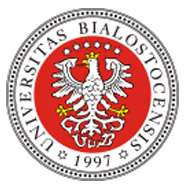 | |
| Latin: Universitas Bialostocensis | |
| Type | Public |
|---|---|
| Established | June 19, 1997 |
| Rector | Robert Ciborowski |
Administrative staff | 808 |
| Students | 15 034 |
| Address | Maria Skłodowska-Curie 14, 15-089 , , |
| Affiliations | Socrates-Erasmus |
| Website | www.uwb.edu.pl |
Over 13,000 students are being educated in 31 fields of study, including doctoral studies and postgraduate studies. The University employs nearly 800 academics, almost 200 professors among them.
Every year the University carries out approximately 60 research projects, financed from domestic and foreign funds; it also benefits from the structural funds. Among the University’s many accomplishments are its participation in 6th and 7th Framework Programme for Research, Technological Development and Demonstration, Horizon 2020, Comenius and Aspera as well as the DAPHNE III programme.
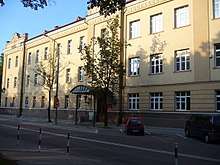
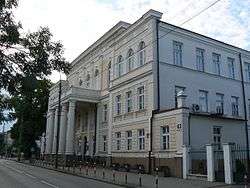
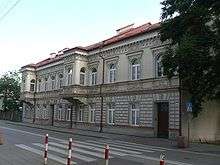
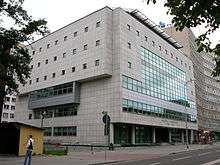
History
University of Białystok was opened on June 19, 1997. The University was established as a result of a transformation of the Branch of the University of Warsaw in Białystok after 29 years of its existence.
The University has a branch in Vilnius, Lithuania.
Foundation
The University of Bialystok Foundation, Universitas Bialostocensis (Polish: Fundacja Uniwersytetu w Białymstoku Universitas Bialostocensis) - independent, non-profit, non-governmental organization located in Białystok, Poland.
Foundation was chartered on April 22, 2004 by founders from the academic circles of the University of Bialystok. Foundation is governed by an independent Board of Directors. Foundation aims organizational, material and financial support for the academic excellence and future development of the University of Bialystok. It runs such activities as: lectures, seminars, conferences, courses and workshops, business and legal consulting, participation in EU funding programs, providing financial support for academic projects and student scholarships, support students’ organizations at the University of Bialystok[1][2][3][4]
Rectors
- Adam Jamróz (1997–2002)
- Marek Gębczyński (2002–2005)
- Jerzy Nikitorowicz (2005–2012)
- Leonard Etel (2012-2016)
- Robert CIborowski (since 2016)
Staff
- Professors: 162
- Habilitated doctors: 7
- Senior lecturers: 291
- Teachers (total): 348
- Total staff: 808
- Number of students: 15 034
International cooperation
International cooperation is also carried out based on about 200 bilateral agreements with institutions from the EU within the framework of the Erasmus programme.
As the first university in the country the University of Bialystok launched a foreign branch in Vilnius, Lithuania; the Faculty of Economics and Informatics has been created there, which educates people of mostly Polish origin, but it is also increasingly popular among the Lithuanian youth.
In 2013 the University of Bialystok initiated the creation of an international consortium of universities from Poland, Lithuania, Belarus, Ukraine and Russia under the name of Border University Network. It is composed of 10 universities. Cooperation shall include applying jointly for international grants, joint research projects, exchange of research and implementation services.
Faculties
- Faculty of Biology
- Faculty of Chemistry
- Faculty of Economics
- Faculty of Education
- Faculty of History
- Faculty of Law
- Faculty of Mathematics
- Faculty of Philology
- Faculty of Physics
- Faculty of Psychology
- Faculty of Sociology
- Faculty of Theology
References
- EUROPE 2005 The Second International Students’ Meeting in Bialystok
- "Calendar of Internationalism Archive past events 2005". Archived from the original on 2012-02-18. Retrieved 2012-05-15.
- 3rd International Students' Meeting Europe 2006
- The Foundation for the Preservation of Jewish Heritage in Poland Annual Report 2008
External links
| Wikimedia Commons has media related to University of Białystok. |